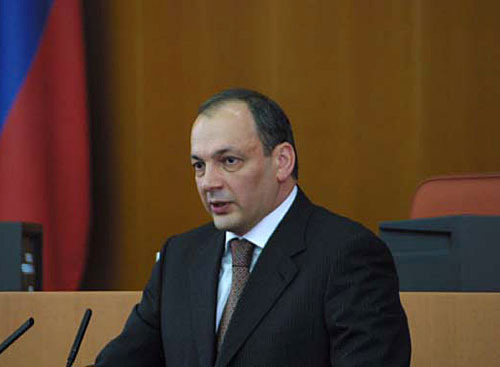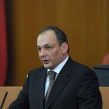
Dagestan’s Increasing Backwardness Blamed on Insecurity and Corruption
Publication: Eurasia Daily Monitor Volume: 7 Issue: 130
By:

On June 29, Dagestan’s President, Magomedsalam Magomedov, delivered his first annual presidential address to the parliament and people of the republic. Magomedov described the contemporary situation in the republic as “complicated, problematic and even prone to crisis.” He tried to strike a balance between criticizing the law enforcement agencies and condemning the insurgency. Citing the precarious security situation in the republic, Magomedov proclaimed that corrupt and incompetent policemen as well as other state officials were in fact insurgent accomplices. He called on insurgents to surrender, saying that “the quantity of the liquidated fighters cannot be an indicator of success.” According to Magomedov, 99 terrorist attacks and 743 attacks on law enforcement agents have been carried out since 2000, as a result of which 420 servicemen died and 696 were injured. These attacks also killed 81 and wounded 337 (www.president.e-dag.ru, June 29).
While Magomedov sounded very progressive in his address, it is hard to see how he will be able to influence the behavior of the Russian security services in Dagestan or curb widespread official corruption in the republic. Local authorities have little or no influence over the way the security services operate in Russia’s regions, while political reforms on the local level, like introducing more participatory ways of governance, are politically not feasible.
According to Dagestan’s president, the republic’s economy also provides few grounds for optimism. Seventy-nine percent of the republican budget is supplied by transfers from Moscow. Dagestan has seen stable declines of 30 percent in industrial output in the past several years and only federal budgetary injections into the republican economy has prevented the gap between Dagestan and the rest of Russia from widening further. Productivity in Dagestan is 2.3 times lower than the Russian average. Gross regional product in Dagestan is 33 percent lower than in the neighboring Stavropol region, which has the same number of people as Dagestan. Dagestan has the lowest average wages in the whole North Caucasus Federal District, which includes all the North Caucasus republics except Adygea (www.president.e-dag.ru, June 29).
While Magomedov stressed the need for the state and businesses to strike partnerships to make a leap forward possible, he did not provide details. Given the very limited scope for political action that the local leaders in the North Caucasus have, one can assume that the reforms they make will also be of very limited scope. The Dagestani president’s message resembles President Dmitry Medvedev’s statements on modernization, introducing modern technologies into life, etc. But in the same way that many people in Russia are skeptical about Medvedev’s ability to modernize the Russian economy without touching its illiberal political system, the Dagestani leader’s initiatives should also be greeted with some reservations. Even though President Magomedov said he would take under his personal control investigation of the incident involving the female Dagestani lawyer Sapiyat Magomedova, who was beaten up at a police station on June 17, little real action has been taken to prosecute the perpetrators (www.kavkaz-uzel.ru, June 25).
Dagestan has a population of 2.7 million which, unlike the rest of Russia, is growing at a fast pace. The success of the newly created North Caucasus Federal District will greatly depend on how the situation in Dagestan evolves, because of the size of its population, ethnic diversity, long standing Islamic tradition and natural resources.
Dagestan requires a skillful leader who would be able to navigate among the various groups in the republic. For example, under the current rigid political system throughout Russia and especially in the North Caucasus, Dagestan is one of the few places where the opposition can stage a public protest action against one of the republican districts. One such action occurred on June 28 in Makhachkala, where protestors demanded the replacement of the head of Dagestan’s Bezhti district (www.ndelo.ru, June 28).
The biggest republic of the North Caucasus also has strong political figures like the mayor of Makhachkala, Said Amirov, who seems to be set to become the mayor for yet another term (www.riadagestan.ru, June 30). In the past Amirov was considered for the leadership of Dagestan each time the issue of a replacement arose.
The volatility of the situation in Dagestan has changed little since Magomedov came to power in February 2010. Since then, members of the Dagestani insurgency have been accused of carrying out the most notorious terrorist attack in Russia in recent years –the March 29 twin suicide bombings on the Moscow metro. Attacks and counterterrorism operations take place in the republic on a regular basis. On June 29, yet another train was derailed in Dagestan, causing some structural damage but no casualties. On June 27, the law enforcement agencies claimed a great success when they stormed a building in Derbent in southern Dagestan, killing two suspected insurgents and capturing five. According to the police, the militants had planned to attack a top local official and then take over a police station and its arsenal after the police were distracted by the first attack (www.kavkaz-uzel.ru, June 28).
The Dagestani president’s task to normalize the situation in the republic and put economic growth on track seems to be even more challenging, given that he has few real instruments to introduce any reforms. Moscow zealously tries to install the same vertical of power across Russia, allowing little deviation from the general concept of a highly hierarchical and rigid political system that deprives the local populations and authorities of the chance to make any necessary adjustments. This, in turn, marginalizes the regional authorities, who are called on to make changes without having the power to do so.




